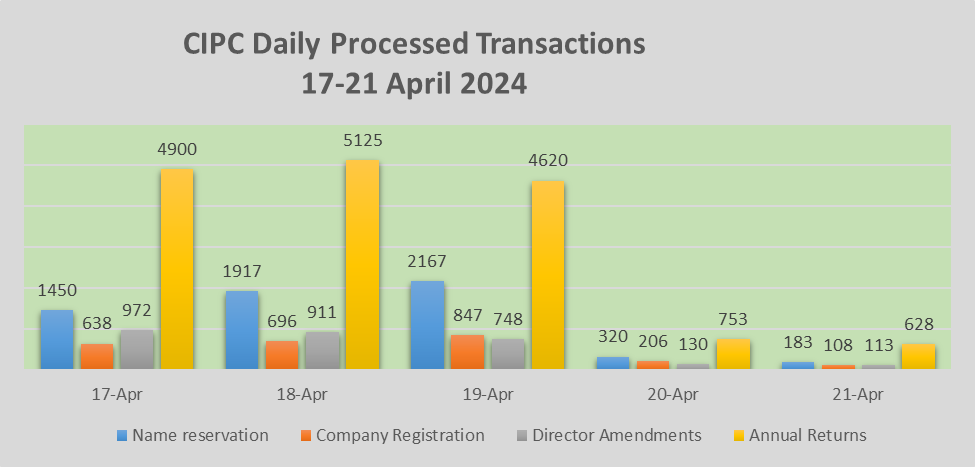Chapter 6 of the Companies Act 2008 (Act 71 of 2008) provides for the efficient rescue and recovery of financially distressed companies, in a manner that balances the rights and interests of all relevant stakeholders. All businesses that are financially distressed and want to take a decision to start rescue proceedings can file a notice to start business rescue proceedings with the CIPC.
Business rescue can be initiated by:
- The board of directors;
- By an application to court when the business is financially distressed;
- Various affected persons by application to court (including shareholders, creditors, registered trade unions and employees).
The decision by a board to pass a resolution for business rescue needs to be done urgently to enable the business rescue practitioner to take control for the purposes of having a business rescue plan approved and thereafter implemented.
A business rescue practitioner will be appointed to oversee and supervise on a temporary basis the management, affairs and business of the company and to devise, prepare, develop and implement a business rescue plan. The plan will be implemented if approved by creditors and shareholders to the extent that the rights of the shareholders will be affected.
A director or a member would have a duty to consider passing a resolution for a company’s business rescue or alternatively resolve to wind up or liquidate as soon as he or she becomes knowingly aware that the company is either:
- financially distressed or
- is trading in insolvent circumstances (both factually in that its liabilities exceed its assets, and commercially in that it cannot pay its debts to creditors as and when they fall due
During the company’s business rescue proceedings, each director of the company:
- would continue to exercise the functions of a director subject to the authority of the practitioner duly appointed
- must assist the practitioner that is expected to operate the company and to continue to run its business
- may delegate any power or function to the practitioner duly appointed that would have full management control of the company in substitution for its board and pre-existing management.
Important: No liquidation proceedings must have commenced against the company when a decision is taken to start business rescue proceedings. Only applications that must be filed by CIPC in terms of Chapter 6 of the Companies Act, 71 of 2008 must be filed via the authorised platforms. CIPC does not read, file or store, other matters of business rescue e.g. minutes of creditor meetings, correspondence between affected parties or attorneys. Submitting such documents negatively impacts the ability of CIPC to effectively and efficiently process matters that must be submitted to it. If further documents or information is required regarding the administration of business rescue, CIPC will request such directly from the practitioner or company or close corporation.
File for business rescue
File Notice of Commencement of Business Rescue Proceedings (form CoR123.1) or court order commencing business rescue proceedings:
Application may only be submitted via New E-Services by capturing the required form information and uploading the relevant supporting documents. Once submitted, the service will provide a reference number (or previously called a tracking number) and refer the information and documents, for back office review and approval. The application will only be regarded as filed, once back office have confirmed or approved the submitted information and supporting documents. It should be noted that the submission of the information via the authorised platform, does not constitute filing. Filing only occurs once back office has confirmed the information and supporting documents meets the relevant legal, process and submission requirements.
Click here for the step-by-step guide for registering as a customer via New E-Services.
Click here for step by step guide for business rescue proceedings via New E-Services.
Click here for the CIPC service standards. Service Standard is dependent on payment for the transaction being made.
Click here to log an enquiry (only after the indicated service standard has lapsed).
File and Publish Notice of Appointment of Practitioner
Within five days after the date of board resolution and submitting the CoR123.1 with supporting documents to CIPC via the authorised platform (and receiving a confirmation letter from CIPC that the company or close corporation has been placed into business rescue), the company or close corporation must appoint a person who qualifies to be a business rescue practitioner, in good standing of the professional accredited by the Commission and has been licensed by the Commissioner as a business rescue practitioner.
Click here for the step by step guide for registering as a customer via New E-Services.
Click here for the step by step guide for licensing as business rescue practitioner via New E-Services.
Click here for the step by step guide for notice of appointment of a business rescue practitioner via New E-Services.
Click here for the CIPC service standards. Service Standards is dependent on payment for the transactions being made.
Click here to log an enquiry (only after the indicated service standard has lapsed).
File a status report with CIPC
The Practitioner must file a status report (CoR125.1) with CIPC after three months by e-mailing it to businessrescue@cipc.co.za. If business rescue proceedings are not concluded within 3 months, or within the time extension granted by court, the business rescue practitioner must file monthly report updates with the CIPC and to the court, in the case of a court-ordered business rescue process, until the proceedings are concluded.
NB: Lodgement of a passport copy is only accepted as proof of identity for non-residents of South Africa. For South African residents a green bar-coded/ smart ID copy must be lodged.
E-mail: businessrescue@cipc.co.za

